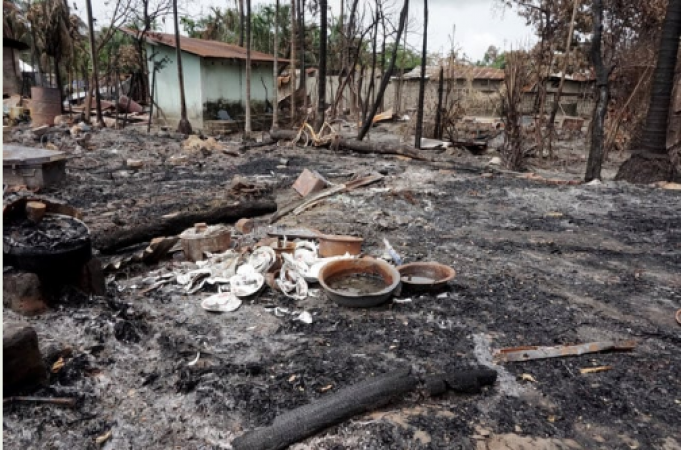
New York City: In order to protect the vulnerable Rohingya population in Rakhine State of Myanmar, the international community has been urged to "do a lot more" by the independent UN expert tasked with investigating the situation there.
Tom Andrews, who holds the title of UN Special Rapporteur on the situation of human rights in Myanmar, cautioned that failing to take action would increase the likelihood of another 2017.
This was in reference to the brutal persecution of the Rohingya, which started about six years ago with a military crackdown on their community, during which thousands of people died and more than a million people were ultimately forced to flee to other countries.
Also Read: This Islamic country to impose Rs 4 lakh crore fine on Pak!
The same groups that carried out "those genocidal attacks" are now in charge of the nation, according to Tom Andrews, and "the Rohingya people's human rights are not their priority."
The largest exodus of Rohingya Muslims from Myanmar started on August 25, 2017, after the military there launched brutal operations in northern Rakhine State that were directed at them. Rohingya Muslims have been the target of violence, discrimination, and persecution for decades.
According to Amnesty International, the violence that followed produced serious crimes against humanity. More than 700,000 people, half of whom were children, were forced to flee to Bangladesh by the junta, which also set entire villages on fire. Today, nearly 1 million Rohingya live in overcrowded refugee camps at Cox's Bazar in Bangladesh.
According to Andrews, who recently returned from a fact-finding mission and presented his report on the situation to the UN in New York, more than 600,000 Rohingya continue to reside in Rakhine State, with 130,000 of them living in improvised internment camps.
Even the people who live in the villages are encircled, he declared. The inhabitants of their own villages are imprisoned. They essentially have no rights at all. Living in such oppressive circumstances is very, very unpleasant.
The special rapporteur claimed that the Rohingya community's frustration and anger over the lack of accountability for the atrocities committed against them "is pervasive."
Many people contend that the military leaders who carried out the February 2021 coup were aware of the lack of responsibility for the genocide that took place in 2016 and 2017.
Also Read: 'Something is wrong,' Elon Musk says as he makes his Twitter account private
"You know, why not get away with another if you could get away with one? If the international community is unwilling to enforce justice in one, perhaps they will simply ignore what transpires in the wake of the coup.
Therefore, failing to hold those responsible accountable is tragic and unfair, not only for those who suffer but also for those who will suffer at the hands of the very same forces who will be convinced that the world doesn't care.
This month, a human rights organisation and a group of individuals from Myanmar filed a criminal complaint in Germany demanding that Myanmar's generals be held accountable for alleged genocide, war crimes, and crimes against humanity committed during the persecution of the Rohingya minority in 2017 and following the military takeover in 2021.
Karim Ahmad Khan, the prosecutor for the International Criminal Court, has stated that a probe into the crimes against the Rohingya will be a top priority during his term.
Such legal procedures are "slow and burdensome, and they are no consolation to the people who have lost loved ones in the most horrific of ways," lamented Andrews. He urged the international community to support them wholeheartedly and take the "very least" action it can.
In order to make the SAC (the State Administration Council, which currently rules Myanmar) understand that there is a cost to pay and that what they are doing is not sustainable, he said, "we need to create the kind of pressure on them. Unless and until they receive that message from the international community, impunity will continue to reign."
Andrews referred to the coup as "illegal" and the military's claim to be the nation's legitimate government as "illegitimate" in his report to the Human Rights Council, which was released on the eve of the second anniversary of the military coup in Myanmar that toppled Aung San Suu Kyi's elected government.
He urged countries that support human rights to acknowledge the National Unity Government—the main underground organisation coordinating resistance to the military regime—as the legitimate representatives of Myanmar's population. It was created by elected officials who were prevented from taking office after the military took over.
According to Andrews, UN members "have an important responsibility and role to play in determining whether Myanmar's military junta will succeed in gaining legitimacy and taking control of a nation in uprising."
He called the situation in Myanmar "the forgotten war" and charged that "the junta's systematic crimes against humanity and war crimes" were not being adequately addressed by the international community.
He claimed that since the military took over, at least 2,900 people have died and probably many more; 17,500 people are held as political prisoners; and at least 38,000 homes, clinics, and schools have been completely destroyed.
More than 4 million children lack access to a formal education, there have been 1.1 million total displaced people, and this year, 17.6 million people are predicted to require humanitarian aid, up from 1 million before the coup.
Also Read: Conflict over Abbas's succession may "collapse" Israeli Authority
Former US congressman Andrews argued that the crisis requires a fresh, coordinated global response.
In his report, he also stated that the military's control over the nation "is weakening," and according to his investigation, the junta has found it difficult to travel and access the money it needs to continue operating because of international sanctions.
However, he continued, "the issue is that the sanctions are not coordinated."